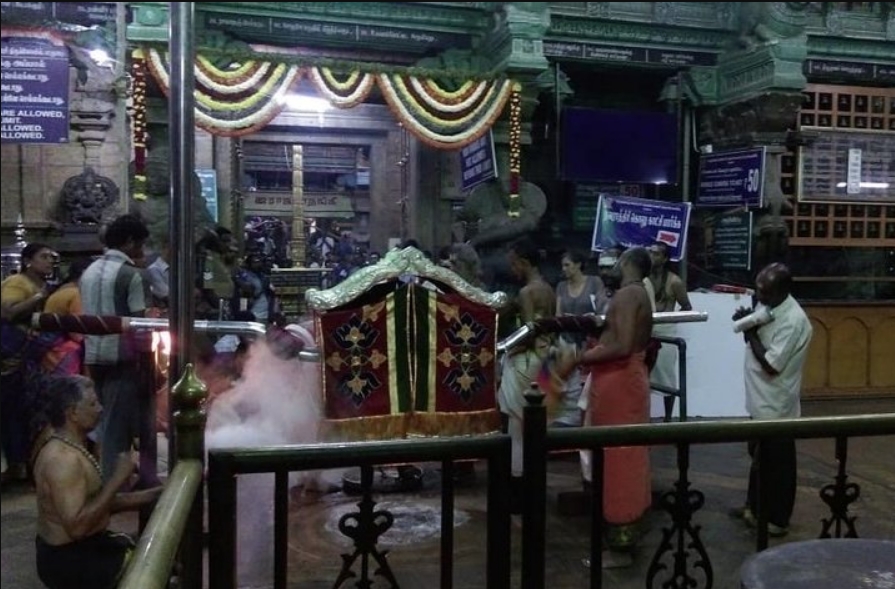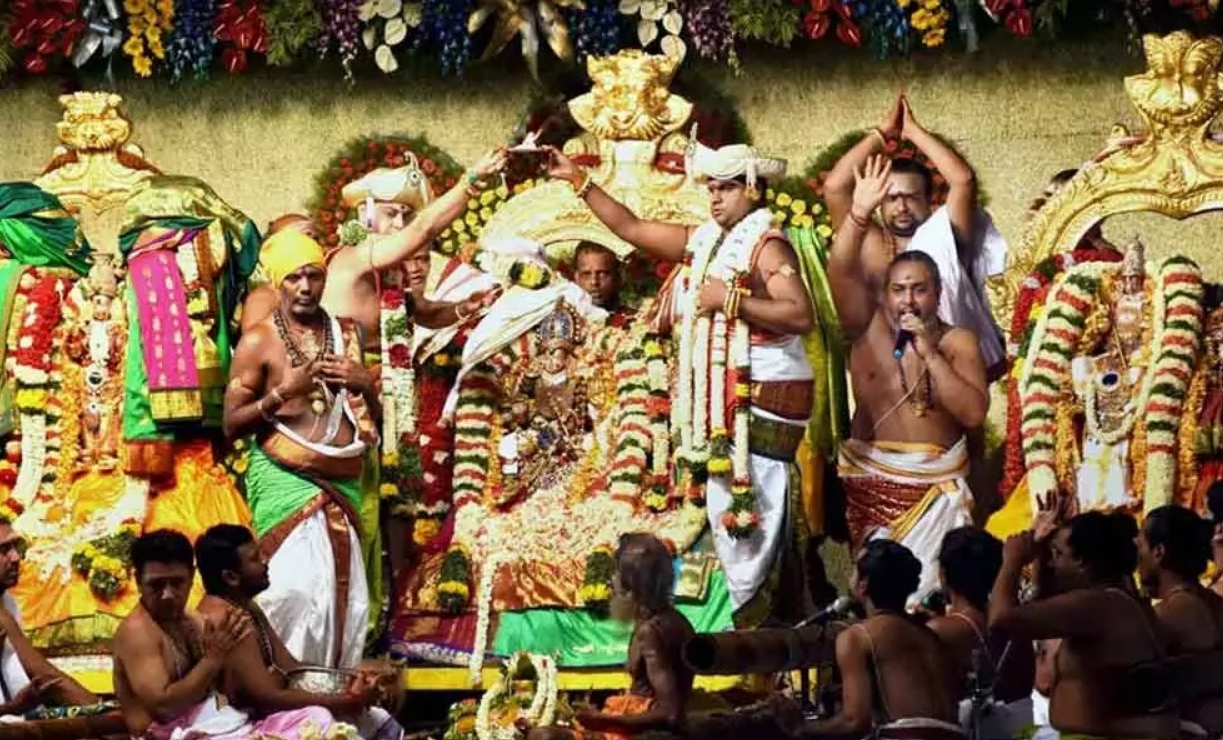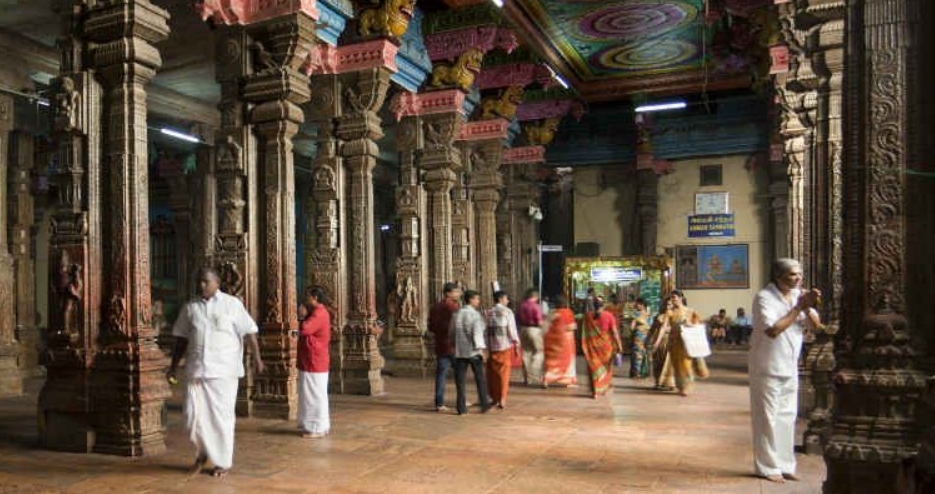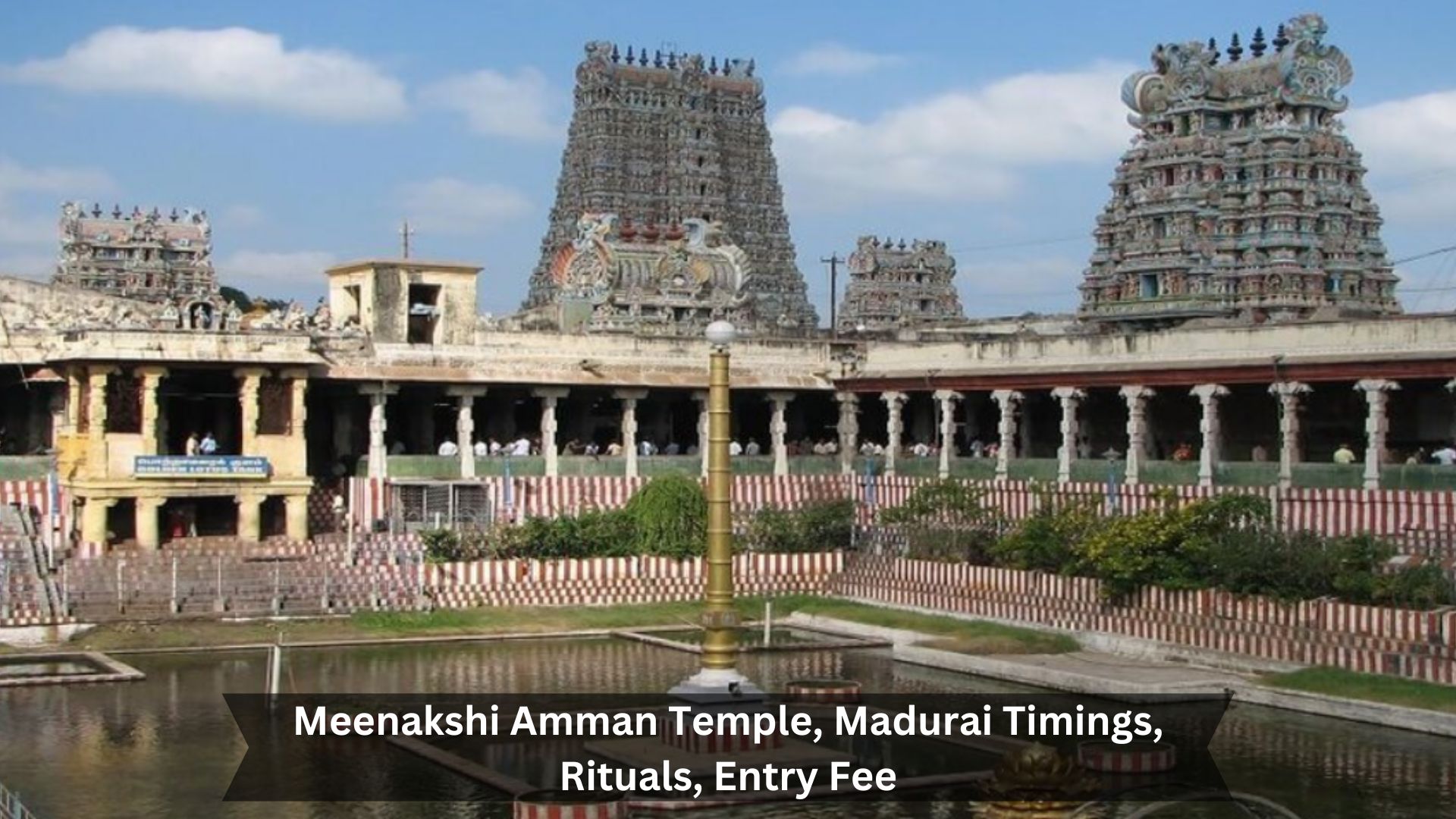Key Takeaways
- The temple is open daily from 4:30 AM to 10:00 PM, including all the ceremonies and prayers.
- The morning prayer starts at 5 AM and the evening one at 7:30 PM.
- There are eight different prayers every day, including special rituals like Abhishekam and Alangaram.
- You don’t have to pay anything to enter the temple.
- The most significant events here are the Chitthirai Brahmotsavam and Navarathri festivals. They draw huge crowds.
The Meenakshi Amman Temple in Madurai, Tamil Nadu, is a stunning example of Dravidian architecture, known for its impressive towers and detailed carvings. This temple is dedicated to Goddess Meenakshi and Lord Sundareswarar. It has stood strong through wars and natural disasters, showing the unyielding spirit and faith of the area.
The temple is famous for its large courtyards, beautiful sculptures, and the Hall of Thousand Pillars. Each part of the temple tells a story from ancient Tamil culture. It’s not just a place for worship; it’s also a hub of culture that draws pilgrims and tourists eager to experience its history and spirituality.
Let’s chat about this: Imagine walking through those vast courtyards or looking up at the grand sculptures. It’s more than just stone and carvings; it’s a living museum where every corner has a story to tell. Isn’t that something?
Timings and Rituals at Meenakshi Amman Temple
Temple timings

The Meenakshi Amman Temple in Madurai is open every day from 4:30 AM to 10:00 PM. This long schedule helps visitors come at their best time, whether early morning or late evening. You can catch a peaceful moment or join in the evening’s lively spiritual activities.
| Puja and Darshan | Time |
|---|---|
| Temple Opening Time | 4:30 AM |
| Maalai Pooja | 4:30 AM – 5:15 AM |
| Thiruvanandal Pooja | 5:00 AM – 6:00 AM |
| Vizha Pooja | 6:30 AM – 7:15 AM |
| Kalasandhi Pooja | 6:30 AM – 7:15 AM |
| Darshan | 7:15 AM – 10:30 AM |
| Thrukalasandhi Pooja | 10:30 AM – 11:15 AM |
| Uchikkala Pooja (Noon Pooja) | 10:30 AM – 11:15 AM |
| Darshan | 11:15 AM – 12:30 PM |
| Temple Closing Hours | 12:30 PM – 4:00 PM |
| Temple Reopens | 4:00 PM |
| Darshan | 4:30 PM – 7:30 PM |
| Ardhajama Pooja (Night Pooja) | 7:30 PM – 8:15 PM |
| Darshan | 8:15 PM – 9:30 PM |
| Palliarai Pooja | 9:30 PM – 10:00 PM |
| Temple Closing Time | 10:00 PM |
The temple is almost always open throughout the year. It only closes for short periods during eclipses or some festivals, mainly for cleaning or special private events. This way, everyone can participate in the rituals and experience the temple’s spiritual life.
Rituals and pooja timings
| Puja | Time |
|---|---|
| Maalai Pooja | 4:30 AM – 5:15 AM |
| Thiruvanandal Pooja | 5:00 AM – 6:00 AM |
| Vizha Pooja | 6:30 AM – 7:15 AM |
| Kalasandhi Pooja | 6:30 AM – 7:15 AM |
| Thrukalasandhi Pooja | 10:30 AM – 11:15 AM |
| Uchikkala Pooja (Noon Pooja) | 10:30 AM – 11:15 AM |
| Ardhajama Pooja (Night Pooja) | 7:30 PM – 8:15 PM |
| Palliarai Pooja | 9:30 PM – 10:00 PM |

Knowing when the Meenakshi Amman Temple opens is critical to planning your visit. It’s open from 4:30 AM to 10:00 PM every day. There are eight different poojas throughout the day. The day starts early with the Aarti at 4:30 AM, where worshippers can watch the ceremonial washing of the deities.
The day is then filled with various rituals like Abhishekam, Alangaram, and Naivedyam. The evening Aarti happens at sunset, and there’s a night Aarti at 7:30 PM. You can choose from several special poojas at set times, which gives everyone a chance to join in these sacred practices.
Dress code

When you visit Meenakshi Amman Temple, following the dress code really helps everyone have a better spiritual experience. The temple has dress rules to maintain sacredness and respect for the place.
Men should wear traditional dhotis or pants with a shirt, and women should wear sarees, half sarees, or churidars, making sure to cover their heads. Kids need to wear clothes that cover them entirely.
These rules keep the temple’s cultural spirit alive and ensure a respectful spiritual atmosphere. Following these guidelines helps you connect more deeply with the spiritual and cultural importance of your visit to this holy place.
Entry Fee and Festivals at Meenakshi Amman Temple
Festivals celebrated at the temple
The Meenakshi Amman Temple is alive with celebrations all year round. Here are some of the main ones:
- Chithirai Festival: This festival lasts 12 days in April. It is about the wedding of Goddess Meenakshi and Lord Sundareswarar. Thousands of people come to see it, making it a big event.
- Aavani Moola Festival: In August, this festival takes place to honor the crowning of Lord Sundareswarar. It includes plays and processions that show off Madurai’s rich traditions.
- Navarathri Festival: Held over ten days in September or October, this festival focuses on Goddess Meenakshi. It includes many rituals, cultural shows, and a special display of dolls called ‘Golu’.
These festivals showcase deep traditions and bring people together, creating memorable moments.
Best time to visit
The best time to visit Meenakshi Amman Temple is during festival seasons or early in the morning. The Chithirai Festival in April is a great time to go. It celebrates the wedding of Goddess Meenakshi and Lord Sundareswarar with unique rituals and colorful parades.
Also, the temple is quieter in the early mornings, so you can enjoy a more calm visit. Entry is free, but you might need to pay a little extra for special access or certain rituals. Visiting during Navaratri and Teppotsavam is also fantastic. These festivals show off the temple’s rich traditions. So, plan your trip to catch these significant events and experience the spiritual vibe of this critical place in Madurai.
Conclusion
The Meenakshi Amman Temple in Madurai is more than just a place of worship; it’s a hub of spiritual and cultural activity that lasts all day. Best of all, there’s no entry fee, so everyone can come and experience the sacred environment and participate in the daily rituals.
The temple’s openness to all plays a crucial role in keeping its cultural importance alive. It helps ensure that these traditions will continue inspiring people for years.

Deepak Sharma is a passionate writer and avid traveler who specializes in uncovering the beauty and history of India’s attractions and temples. A graduate of Delhi University, Deepak has a deep-rooted love for his country and its rich cultural heritage.
